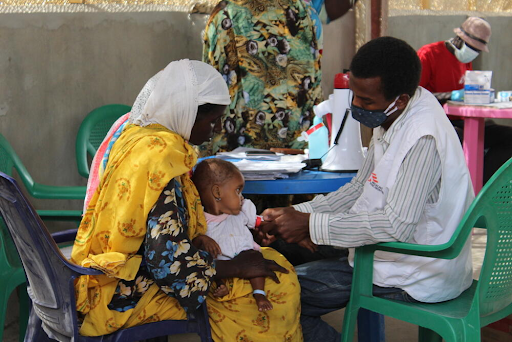Climate Change Causing Acute Malnutrition, Food Insecurity In Chad – MSF Warns
As the Sahel Region is considered the world’s most vulnerable to climate change, Doctors without Borders has warned of dire consequences.

Medicines Sans Frontier/Doctors Without Borders (MSF) has revealed that residents and children in Chad are likely to suffer from acute malnutrition due to climate change.
Chad’s Sahel region is considered one of the world’s most vulnerable to climate change, with rising temperatures, erratic rainfalls, and increasing desertification.
Ibrahim Barrie, MSF medical team leader, revealed that in late 2021 “the cases of malnutrition were exacerbated by an unusually short rainy season.”
“Over the last ten years, Chad’s Saharian and Sahelian zones have spread 150 km south, resulting in reduced farming and pasture areas.”
Malnutrition plague in Chad
“Malnutrition is a recurrent, chronic crisis in Chad caused by poor harvests, inadequate dietary choices as well as socio-cultural factors and affects children under five, pregnant and lactating women.” the official said.
In Sept. 2021, MSF launched a nutrition response in Chad’s Hadjer Lamis province after receiving an alert about a significant number of severe acute malnutrition cases recorded in the area.
“More than 28,000 predicted for 2021, a significant number of severe acute malnutrition cases in the area were recorded – and learning that only one of the province’s five health districts was receiving support.”
MSF cited a case of Khadija Iba, a mother of six currently treating her youngest child for malnutrition at the therapeutic feeding center set up by MSF in Massakory, a small town in Chad’s Sahel belt, for over a month now.
She emphasised that Chad experienced little rain last year. “It was worse than any year I can remember, we hardly harvested anything. We need to buy vegetables at the market, but everything costs almost twice as much now. We don’t have enough to eat.”
Also, one Osman Abakar says that this year, the young men left earlier to find work in other parts of Chad or neighbouring countries such as Cameroon, Niger, and Libya in search of better pastures.
“The young men left earlier than usual due to the bad harvest, we are afraid of the future,” he says. “All we can do is wait for the next rains. If the rain abandons us another time, we don’t know what to do.”
Despite the armed violence and prolonged humanitarian crises in Chad, the biggest concern for people is the lack of water.
Khadidja Mahamat, said despite having two wells in her village, the water is not enough for people and animals.
“The water tastes bad, we mostly give it to the animals. To get drinking water, I go by donkey to another village. It takes me one-and-a-half hours each way,” Khadidja said.
“The bad water quality causes diarrhea and other health issues, increasing the risk for children of being malnourished.”
What is to come
After the most acute phase of malnutrition in Hadjer Lamis, the charity organisation said they had treated more than 1,600 children in outpatient therapeutic feeding centers in the first 15 weeks. “However, the team is also preparing for next year.”
“There is some fear that the worst is yet to come, the hunger gap will start earlier than usual, and that it could be longer and more severe. It’s an ongoing crisis, no longer just a hunger gap,” the health official said.
In phase 3 to 5 of the Cadre Harmonisé report (a unified tool for consensual analysis of acute food and nutrition insecurity in the Sahel and West Africa), the result showed that from June to Aug. 2022, 1.73 million people will be suffering from food insecurity.
According to the SMART 2020 survey, the prevalence of global acute malnutrition in children under 5 five years of age is 10 per cent, including 2.1 per cent of severe acute malnutrition (SAM). It is estimated that 1.9 million acutely malnourished children aged 6 to 59 months will require treatment.
Prevention
According to MSF, besides the health team treating children in therapeutic feeding centers in seven health districts of the province and supporting the treatment of severely malnourished children in Massakory hospital.
“MSF teams also visit remote villages in the area to teach mothers how to prevent and detect malnutrition in children,” Ibrahim said.
“Health promoters show mothers how to use MUAC bands, a colour-coded paper band that is wrapped around a child’s arm and indicates if a child is healthy, slightly or severely malnourished.”
Additionally, Ibrahim added that “Funding for nutrition and food security in Chad has gone down. We need a better aid response to prevent children from dying from malnutrition.”
Support Our Journalism
There are millions of ordinary people affected by conflict in Africa whose stories are missing in the mainstream media. HumAngle is determined to tell those challenging and under-reported stories, hoping that the people impacted by these conflicts will find the safety and security they deserve.
To ensure that we continue to provide public service coverage, we have a small favour to ask you. We want you to be part of our journalistic endeavour by contributing a token to us.
Your donation will further promote a robust, free, and independent media.
Donate HereStay Closer To The Stories That Matter




